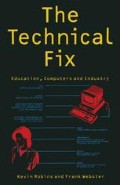Abstract
So far we have concentrated, in this part of the book, on the relationship of the education system to the world of industry and business. We have focused on the changing nature of this relationship in the context of a broad shift from a Fordist to a neo-Fordist regime of capital accumulation. In this chapter our concern is with the implications of this transformation for the prevailing power relations in society. The emergence of neo-Fordism, we shall argue, is closely associated with changes in the form and modality of social control. Of course, the control dimensions of education are related to the economy since the latter depends upon an adequate machinery of social discipline and control as its precondition. However, this does not mean that relations of power are simply subordinate to, and functional for, economic needs: we recognise that the relationship is complex and difficult and, indeed, a contentious matter in social theory to which we cannot do justice here. Our aim is, more modestly, to explore changes in the nature of education as a system of discipline and control, and to signal moves towards synchronisation of these changes consequent upon the transition to neo-Fordism.
‘For capital, the reassertion of authority is the precondition for everything else.’ (John Holloway, 1987, p. 163)
Preview
Unable to display preview. Download preview PDF.
Copyright information
© 1989 Kevin Robins and Frank Webster
About this chapter
Cite this chapter
Robins, K., Webster, F. (1989). The New Disciplines. In: The Technical Fix. Palgrave, London. https://doi.org/10.1007/978-1-349-20120-4_8
Download citation
DOI: https://doi.org/10.1007/978-1-349-20120-4_8
Publisher Name: Palgrave, London
Print ISBN: 978-0-333-42901-3
Online ISBN: 978-1-349-20120-4
eBook Packages: Palgrave Social & Cultural Studies CollectionSocial Sciences (R0)

